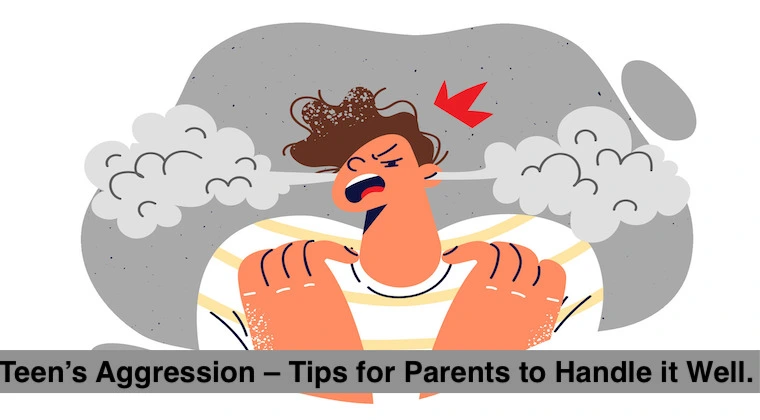+1 845 259 2974 (11 a.m to 7 p.m CST)
Teen’s Aggression – Tips for Parents to Handle it Well

Teen aggression is a growing concern for many parents. It can manifest as anger, irritability, or even violent behavior. Various factors contribute to this issue, including hormonal changes, peer pressure, and family dynamics. Understanding and addressing teen aggression early is crucial. If left unchecked, it can lead to serious problems such as poor academic performance, strained relationships, and even legal troubles.
Early intervention helps teens learn to manage their emotions better and develop healthy coping mechanisms. It also prevents the escalation of aggressive behavior into adulthood. Parents play a vital role in identifying the signs of aggression and taking proactive steps to address it. By doing so, they can ensure their teen's well-being and foster a positive environment for their growth.
Understanding Teen Aggression
Teen aggression is a complex issue that can arise from a variety of sources. It’s important for parents to understand what might be causing their teen's aggressive behavior to address it effectively. By recognizing the common causes and signs, parents can take proactive steps to help their teens manage their emotions and behavior.
Common Causes
Several factors can contribute to teen aggression. Understanding these can help parents identify potential triggers and address them accordingly.
- Hormonal Changes: During puberty, teens experience significant hormonal changes. These fluctuations can lead to mood swings and irritability, which may manifest as aggression.
- Peer Pressure: The desire to fit in with peers can drive teens to behave aggressively. They might feel the need to assert dominance or gain social approval through confrontational behavior.
- Family Dynamics: The home environment plays a crucial role in a teen's behavior. Conflicts at home, lack of parental attention, or witnessing parental discord can all trigger aggressive responses.
- Media Influence: Exposure to violence in movies, video games, and online content can normalize aggressive actions and desensitize teens to the consequences of such behavior.
- Personal Trauma: Experiences of bullying, abuse, or other traumatic events can heighten a teen's aggression. These experiences can leave emotional scars that manifest as outward aggression.
Signs and Symptoms
Identifying the signs and symptoms of teen aggression is essential for early intervention. Parents need to be observant and attentive to these indicators.
- Behavioral Indicators: Teens displaying frequent outbursts of anger, engaging in verbal or physical fights, and showing defiance towards authority figures are likely exhibiting signs of aggression.
- Emotional Signs: Persistent irritability and frustration, along with a tendency to blame others for their problems, can be key emotional indicators of underlying aggression.
- Social Changes: A noticeable decline in academic performance, changes in social circles, and withdrawal from family activities can signal that a teen is struggling with aggression.
- Physical Symptoms: Physical signs such as clenched fists, tense posture, or sudden destructive actions can accompany aggressive behavior. These symptoms often reflect the teen's inner turmoil.
Understanding these causes and symptoms can help parents recognize when their teen needs support. Differentiating between normal mood swings and persistent aggressive behavior is crucial for effective intervention. Recognizing the root causes aids in developing strategies to manage and reduce aggressive behavior, fostering a healthier environment for the teen's growth.
Parental Role in Managing Aggression
Parents are vital in helping manage their teen's aggression. Their approach to communication and setting boundaries can significantly impact their teen's behavior. By using effective communication techniques and establishing clear rules, parents can create a structured and supportive environment that helps reduce aggression.
Communication Techniques
Effective communication is essential in managing teen aggression. It helps build trust and understanding between parents and their teens.
- Active Listening: Parents should listen attentively to their teen’s concerns without interrupting. This shows empathy and understanding.
- Calm Responses: Responding calmly to aggressive behavior helps de-escalate tense situations and sets a positive example.
- Open Dialogue: Encourage open discussions about emotions and challenges. This helps teens feel heard and understood, reducing their need to act out aggressively.
Establishing Boundaries and Rules
Setting clear boundaries and rules provides structure and helps teens understand acceptable behavior.
- Consistent Rules: Establishing clear and consistent rules helps teens understand acceptable behavior. Consistency in enforcing rules is key to their effectiveness.
- Positive Reinforcement: Rewarding positive behavior can encourage teens to repeat those actions. This can be more effective than only punishing negative behavior.
- Consequences for Aggression: Clearly communicate the consequences of aggressive behavior. Ensuring that consequences are fair and consistently applied helps reinforce boundaries.
By using these techniques, parents can create a supportive environment that fosters better behavior and helps manage their teen's aggression effectively.
Using Parental Controls
Parental controls can be a valuable tool in managing teen aggression. They help parents monitor and limit their teens' exposure to potentially harmful content, creating a safer digital environment.
Benefits of Parental Controls
- Content Filtering: Blocks access to violent or inappropriate content, reducing negative influences.
- Screen Time Management: Limits the amount of time spent on devices, encouraging healthier activities.
- Monitoring Online Activity: Allows parents to keep track of their teen's online interactions, helping to identify and address issues early.
How to Set Up Parental Controls on Devices
Setting up parental controls is straightforward and can vary slightly depending on the device.
- Smartphones and Tablets: Use built-in features like Apple's Screen Time or Google's Family Link to set restrictions and monitor usage.
- Computers: Utilize parental control settings in operating systems like Windows or MacOS, or install third-party software.
- Gaming Consoles: Access parental control options through the console’s settings menu to limit game ratings and playtime.
Additional Strategies for Parents
Encourage Healthy Outlets for Emotions
- Physical Activity: Encourage sports or other physical activities to help teens channel their energy positively.
- Creative Expression: Support hobbies like art, music, or writing as outlets for emotions.
Seek Professional Help if Needed
- Therapy: Consider individual or family therapy to address underlying issues.
- Support Groups: Join support groups for parents and teens to share experiences and strategies.
By combining parental controls with these additional strategies, parents can better manage their teens' aggression and promote a healthier lifestyle.
Managing teen aggression requires a proactive and multifaceted approach. Parents play a crucial role in addressing this issue through effective communication, setting clear boundaries, and using tools like parental controls. Understanding the common causes and signs of aggression helps parents identify problems early and take appropriate action.
By employing active listening and encouraging open dialogue, parents can build a supportive environment that fosters trust and understanding. Consistent rules and positive reinforcement help teens understand acceptable behavior, while parental controls provide an added layer of protection in the digital space.
Encouraging healthy outlets for emotions, such as physical activity and creative expression, can help teens manage their feelings constructively. When necessary, seeking professional help ensures that both teens and parents receive the support they need.























